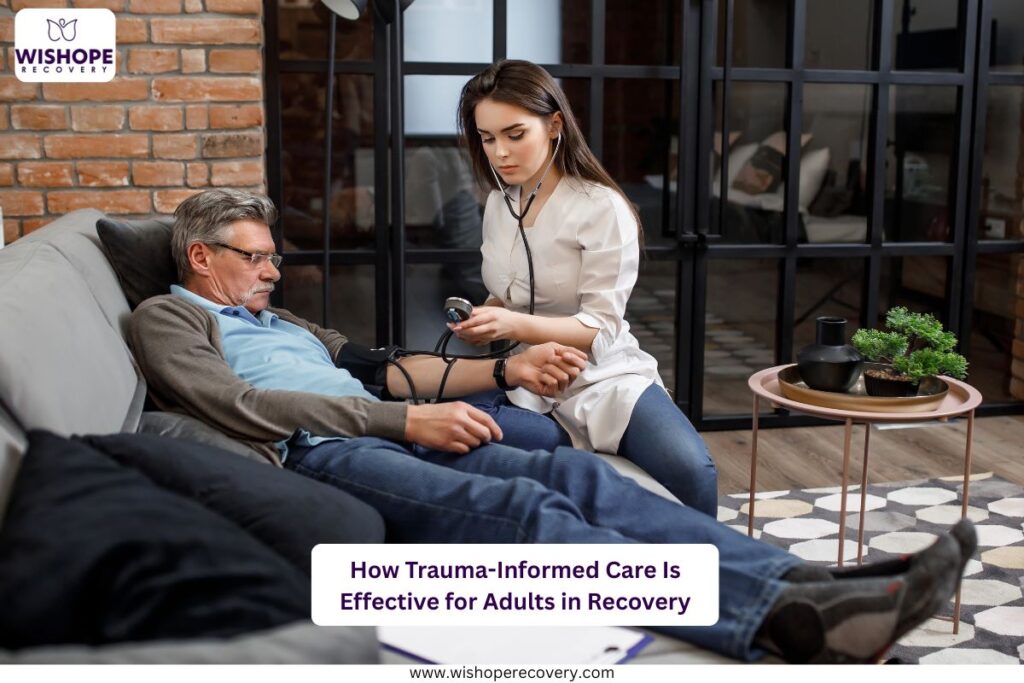Substance use or mental health issues are often not overcome with standard treatments alone. Trauma is a strong factor in influencing behavior, coping skills, and overall well-being for many adults. Trauma-informed care comes into play here. With an understanding of the effects of trauma and building safe and supportive environments, people can heal in ways that usual treatment cannot.
What Is Trauma-Informed Care?
Trauma-informed care is a model in behavioral health and recovery treatment that acknowledges the pervasiveness of trauma and focuses on healing through safety, empowerment, and trust. Instead of being asked, “What’s wrong with you?” it changes the focus to “What happened to you?”
Some major tenets of trauma-informed care are:
- Safety: Establishing spaces where people feel safe.
- Trustworthiness and Transparency: Establishing stable, truthful relationships.
- Peer Support: Fostering commonality for healing.
- Collaboration and Empowerment: Enabling clients to be actively involved in their treatment.
- Cultural, Historical, and Gender Sensitivity: Honoring backgrounds and individual needs.
When used in recovery environments, this method enables clients to treat underlying causes instead of just symptoms.
Why Do Adults in Recovery Need Trauma-Informed Care?
Most adults with substance use or mental health disorders have a history of trauma. Research indicates that unaddressed trauma frequently underlies addiction, anxiety, depression, and other behavioral health issues. Without the addressing of trauma, treatment can become incomplete, even a failure.
Trauma-informed care offers:
- A place to work through painful experiences in safety.
- Knowledge that substance use might be a coping strategy as opposed to being the underlying issue.
- A process of long-term recovery that has fewer chances of relapse.
By treating trauma as a cause, patients become clearer about what they’re doing and learn healthier ways to cope.
How Does Trauma-Informed Care Work in Substance Use Treatment?
Trauma-informed substance use treatment combines standard recovery practices with trauma-sensitive techniques. Rather than forcing people into a one-size-fits-all program, it adjusts to their emotional and psychological requirements.
Some examples are:
- Therapies like EMDR or CBT specifically adapted to trauma recovery.
- Group therapy where peers exchange experience in a non-judgmental way.
- Mindfulness and grounding exercises to cope with triggers.
- Staff training to make all interactions supportive rather than retraumatizing.
This integrated way makes sure that individuals not just recover from addiction but also deal with the underlying reasons which drove it.
What Are the Benefits of Trauma-Informed Care for Adults in Recovery?
The success of trauma-informed care is seen in the positive impacts it produces. Recovering adults typically feel:
- Greater sense of safety within treatment environments.
- Less stigma and shame relating to histories.
- Improved treatment and support group engagement.
- Better emotional regulation and coping abilities.
- Decreased relapse rates as underlying trauma is addressed.
- Increased sense of self-worth and empowerment.
Trauma informed care for adults practices do more than decrease symptoms, they allow individuals to reauthor their story. By increasing resilience, adults have the power to get on with life, not only moving away from addiction but toward a more fulfilling, purpose-filled life.

Why is Trauma-Informed Care for Women Particularly Necessary?
Women usually encounter specific challenges during recovery, such as higher levels of abuse-related, domestic violence, or gender-related discrimination trauma. Trauma-informed care for women offers a space where they are heard and where their experiences are endorsed.
Women gain from:
- Gender-responsive programming.
- Safe spaces where they can share experiences.
- Therapeutic strategies that address recovery and trauma from a holistic perspective.
In the absence of trauma-informed treatment, women can become invisible or misunderstood, and their recovery process may be hindered. Through the provision of environments that address their specific needs, trauma-informed treatment empowers women to take control of their lives.
How Can I Find Trauma-Informed Care Near Me?
If you are looking for trauma-informed care near me, seek recovery facilities that:
- Place advertisements for trauma-informed or trauma-sensitive services.
- Provide alternative therapies like EMDR or trauma-specific CBT.
- Have staff training in trauma awareness.
- Emphasize empowerment, safety, and trust.
Not all treatment centers prioritize trauma, so asking questions during intake can help you find the right trauma-informed care center for your needs.
How Does Trauma-Informed Care Support Long-Term Healing?
Recovery is not a finite process that ends when treatment does. For most adults, the post-rehab or post-counseling life is fraught with challenges like stress, triggers, or relationship issues. Trauma-informed care provides people with tools that they can utilize long after official treatment has ceased.
These tools can include:
- Creating positive boundaries within relationships.
- Identifying and coping with emotional triggers.
- Establishing a web of peer and community support.
- Working on self-care strategies such as mindfulness, journaling, or meditation.
By addressing both short-term stability and long-term resilience, trauma-informed care provides a sustainable avenue to wellness.
FAQs
1. How does trauma-informed care differ from conventional therapy?
Conventional therapy could concentrate on behaviors and symptoms, whereas trauma-informed care focuses on the underlying causes, making people feel safe and supported every step of their way through recovery.
2. Is it possible that trauma-informed care can prevent relapse?
Yes. By treating underlying trauma, clients are less likely to resort to unhealthy coping strategies like substance use.
3. Is trauma-informed care only for those with severe trauma?
No. Trauma-informed care is for anyone who has had tough life experiences that still affect their emotional or mental well-being.
4. How do I know if a center offers trauma-informed care?
You may inquire regarding staff training, therapy services, and if the program prioritizes safety, empowerment, and individualized treatment.
5. Is trauma-informed care effective for adults at all stages of recovery?
Yes. Whether a person is starting recovery or sustaining long-term sobriety, trauma-informed care facilitates healing at all stages.
Final Thoughts
Recovery isn’t merely about halting destructive behaviors; it’s about healing and understanding what led to them in the first place. WisHope Recovery’s informed trauma therapy gives adults the tools and a safe space they need to rebuild their lives with strength and resilience. If you or someone you care about is looking for empathetic recovery resources, consider contacting trauma-informed substance use treatment centers in your area. Healing is achievable when care recognizes the entire individual, not the addiction alone.

